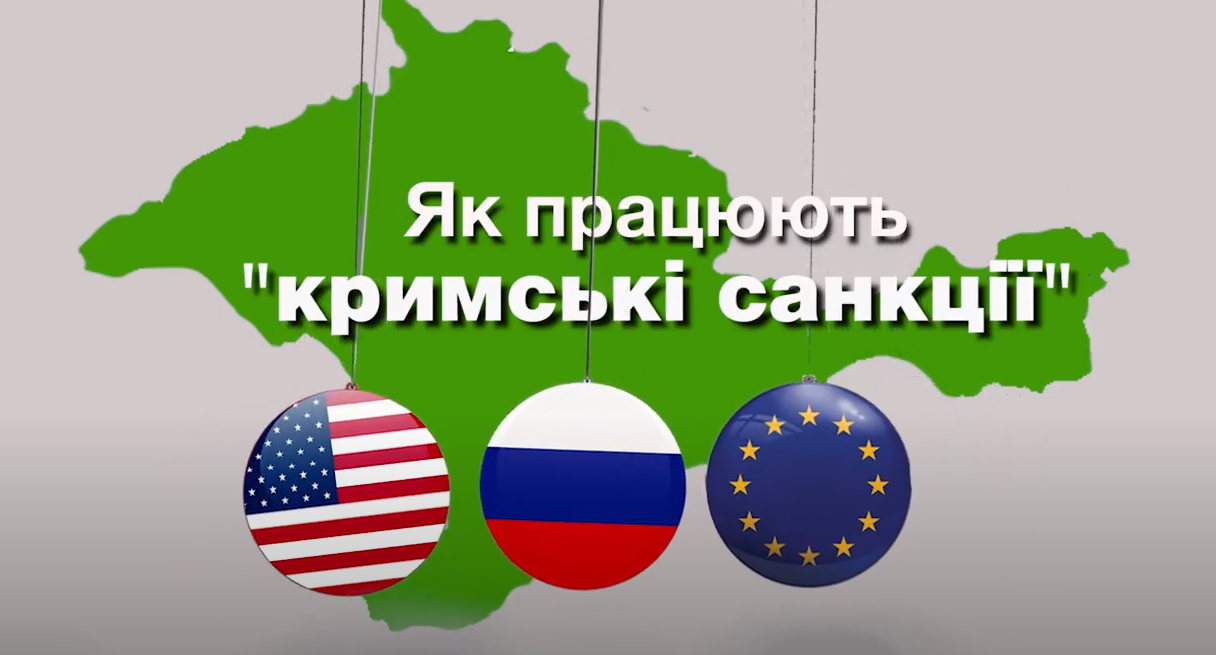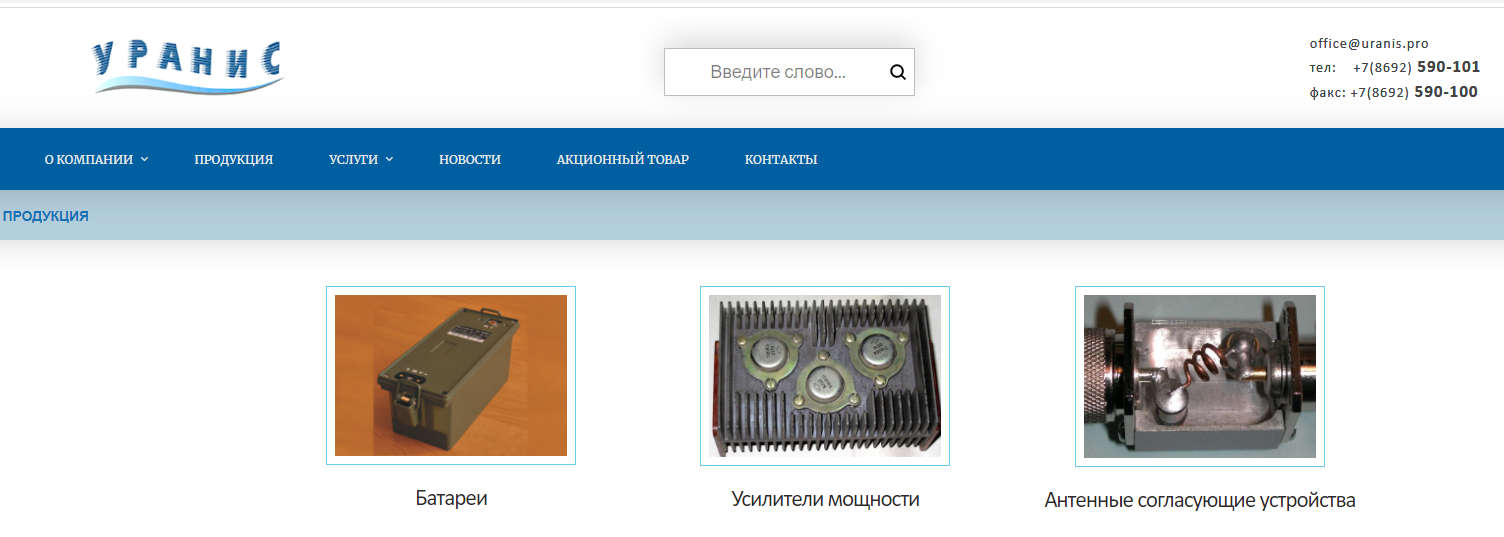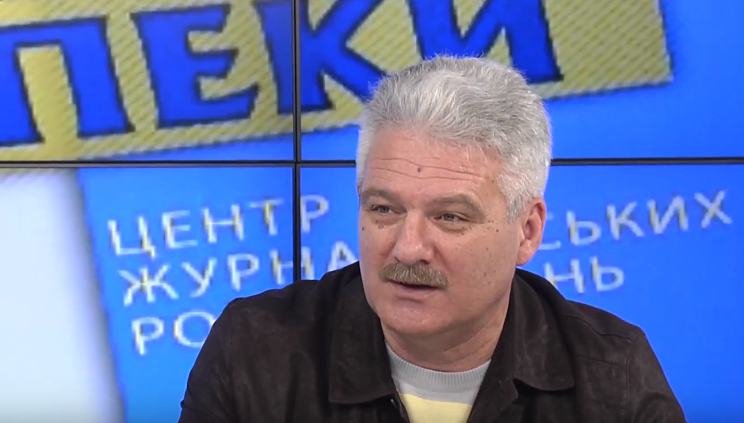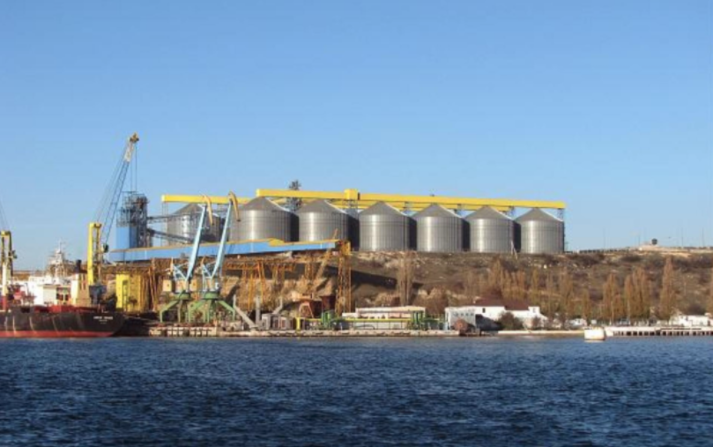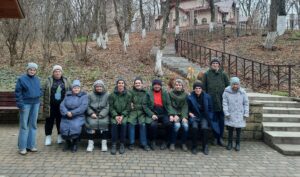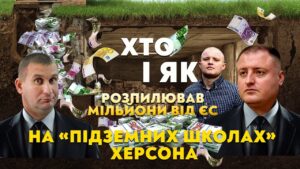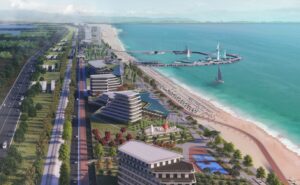«Crimean sanctions» are part of the EU and USA policy to oppose an attempt of the illegal annexation of Crimea and Sebastopol by Russia. Sanctions «for Crimea and Sebastopol» will be active until the de-occupation and return of the peninsula under the Ukrainian control.
Therefore, it is crucial for sanctions to be effective and efficient. In order to secure their effectiveness, it is necessary to know how they work, whether they reach their goals; who and how avoid restrictions; with what sanctions Russia «learnt to live without pain»; and what corrections are needed to strengthen them.
USA and the European Union declared their intent to introduce sanctions against Russia for its actions in Crimea before the so-called «referendum». They realized their intent next day after «referendum» – on March 17, 2014. The first Western sanctions have been against individuals – they targeted public officials whose actions undermined the territorial integrity of Ukraine.
However, «Crimean sanctions» are not only against natural persons as Russian politicians and mass media often emphasize, in order to diminish their importance. Sanctions also target a number of economic sectors. EU and USA sanctions ban their citizens to invest into the Crimean economy, to buy businesses in Crimea or to provide services and goods to Crimean companies since 2014. The total ban has been imposed on banking, energy, transport and construction sectors as well as on oil and gas exploration, exploration of other natural resources and related infrastructure, export of new technologies to these sectors and import of goods from Crimea.
Assets of those in sanction lists have been frozen whereas it has been banned for EU and USA citizens and companies to conduct any transactions with them. Those who violate this ban are under the risk to be sanctioned, too.
Crimean sanctions will be active until de-occupation of Crimea as they are an integral part of the EU and USA policy to oppose an attempt of the annexation of Crimea and Sebastopol by Russia. The Center of Journalist Investigations will uncover the effect of sanctions on various sectors of the Crimean economy in six reports within two months. This material focuses on the most widespread schemes to avoid sanctions by businesses in various economic sectors investigated by our journalists.
Military Industrial Complex. Top secret.
Military Industrial Complex. Top secret
Russia realized the true goal of the annexation and turned the peninsula into the giant military base within first years of the occupation of Crimea and Sebastopol. It drastically changed the balance of power in the region. Even block-conductors of «Chornomornaftogaz» on occupied Ukrainian deposits on Black Sea shelf now serve military purposes – radiolocation equipment to monitor air and under water space has been installed on them.
At first, Russian authorities cautiously introduced «supervisors» on occupied Ukrainian enterprises of the military industrial complex. After those enterprises have been included into EU and USA sanction lists, they have been integrated with the Russian military industrial complex and consequently included into the Defense Acquisition Order (DAO). Tetyana Guchakova, the expert of the Institute of Black Sea Strategic Studies, believes that the main scheme to avoid sanctions in military industrial complex is not within the responsibility of any given enterprise:
«It is the governmental policy of the Russian Federation. It can be described by one word – the secret. The regime of secrecy has been gradually built up. Access to the register of enterprises of the military industrial complex has been closed in September 2015. Some Crimean enterprises have been included into the register. The so-called «black box» of the DAO has been introduced in February 2017. In other words, any defense purchases are conducted behind the closed doors».

Tetyana Guchakova, the expert of the Institute of Black Sea Strategic Studies, Photo: investigator.org.ua
The next protective wall against Western sanctions has been built when the government of the Russian Federation closed an access to data in the Unified Business Register (EGRUL) about legal persons already in sanction lists, located in Crimea or about those legal persons, which could be included into EU and USA sanction lists.
Crimean companies, including private ones, the recipients of the Russian defense orders, try to hide themselves by registering companies on the territory of the Russian Federation or by creating new companies-twins.
As an example, let us look into the company URANIS founded by Igor Kaluzhny and his sons Leonid and Volodymyr in 2006 in Sebastopol on the basis of the factory MUSSON. The enterprise is known in the world as the developer and manufacturer of cheap and reliable radio communication equipment (short and ultra short waves) and sea radio electronic devices (antennas, amplifiers and emergency satellite radio beacons).
Before the occupation of Sebastopol, all URANIS products have been exported. After the occupation, the manufacturing facilities have been registered in the Russian Federation as two entities: JSC «URANIS – radiosistemy» – for the work with the Russian DAO and LLC «URANIS» – for external economic activity (the same title is indicated in the Ukrainian Unified Business Register). It has been done with an intent to receive large Russian defense orders.
This trick with companies-clones and old relations allowed URANIS keeping its exports alive for two years after the occupation of Sebastopol. Western sanctions have been imposed on the company only in 2016. Despite them, the company keeps supplying its products for export – through customs border in Moscow.
Leonid Kaluzhny, the co-founder of URANIS, openly talked about this scheme in his speech at the forum of suppliers of the Russian Ministry of Defense held in Crimea in 2018: «For export purposes our company uses the software for online customs declarations because all our customs operations are conducted in Moscow».
Before occupation, URANIS imported 70% of parts for its products. After 2014, the company had to switch to the import substitution – today it has dozens of Russian suppliers. The same situation can be observed at any enterprise of the Ukrainian military industrial complex seized by Russia.
«Small scale analysis of production chains of thirty Crimean enterprises of the military industrial complex revealed more than 150 Russian partners. Their geography – from Kaliningrad to Khabarovsk. It becomes difficult to find Russian enterprise without relations in Crimea, in particular, in certain sectors», says Tetyana Guchakova.
In accordance with the logic of Western sanctions, all partners of sanctioned enterprises in Crimea and Sebastopol are potential candidates for inclusion into USA and EU sanction lists. The number of these «candidates» is already over one hundred. It means there is the need for sectorial sanctions. For example, «all Russian ship building should be put under sectorial sanctions», believes the researcher.
Financial sector. Correspondent accounts and leasing
«Follow the money», as FBI taught its investigators. Money leave traces. In order to hide from the USA financial intelligence and sanctions, Russia makes secret not only DAO recipients but also banks serving them. Today the legislation allows not disclosing data about banks serving DAO recipients. Before that, the Central Bank of the Russian Federation made their lists public every month.
Sanctions in the banking sector are among the most fearful as the banking system is the financial backbone of any country. After the EU and USA introduced sanctions for the occupation of Crimea, all Ukrainian banks, representative offices of Western banks as well as largest Russian banks left the peninsula. Only six Russian banks, which worked in Crimea and Sebastopol after 2014, survived, out of 33. It seems their number will fall to five banks soon. The Sebastopol Sea Bank owned by Oleksandr Annenkov, «the occupation ferryman», the owner of Kerch passage and of the group of companies «AnRusTrans», went bankrupt. Bank temporary administration has been set up.
That is why schemes to avoid sanctions in the banking sector are implemented outside the peninsula – on the opposite side of the Kerch strait.
Yuri Smelyanski, the economic expert from Crimea, believes that one of the instruments to avoid sanctions is the network of correspondent accounts which Crimean banks open in Russian banks not located in Crimea. As an example, they open them in VTB or «Sberbank». These Russian banks have their own correspondent accounts in Western banks. In their turn, Western banks also open correspondent accounts in Russian banks when they serve Russian companies or conduct transactions on the territory of the Russian Federation. As an outcome, the effectiveness of the isolation of Crimean banks and sanctions introduced by the EU and USA against Crimean financial sector, decreases.
«This is the reason why Ukraine and its Western partners must take strict attitude towards correspondent accounts of Crimean banks. If the Russian bank has correspondent account in the Crimean bank, then, it must be excluded from the worldwide system of correspondent accounts. If you would like to have the account of the Crimean bank, or Russian authorities force you to open it – there is no problem. Then USA and European banks will not allow you opening such an account with them and will not open their accounts with you», this is the Yuri Smelyanski’s proposal to close this scheme.
In order to make financial transfers or to buy goods online, Crimean inhabitants also use correspondent accounts. They open them in banks located on the territory of neighboring Krasnodarsk regions. Not leaving Crimea, they can receive by mail plastic Mastercard or Visa cards issued by non-Crimean banks (no one Crimean bank issues them).
Crimeans’ tricks with online purchases put AMAZON under the risk of being fined one million USD by the United States Department of Treasury. When ordering goods, Crimean inhabitants put wrong name «Krimea» instead of «Crimea» and misled AMAZON identification system.
Companies-clones
How does the scheme work? Crimean companies are «cloned» and registered simultaneously in Ukraine and Russia or in Crimea and the Russian Federation. Several bans are avoided – on investments to Crimea, on opening new business and on export of goods produced in Crimea. Ukrainian oligarchs and millionaires can be treated as authors and pioneers of this scheme.
Dmytro Firtash, the owner of Titan factory in occupied Crimea, changed its legal address to Kyiv, the title – to Ukrainian Chemical Products whereas production facilities themselves have been called «Armenian branch». At the same time, authorized proxies registered LLC «Titanovye investitsii» in Moscow. This company leased the production facilities. After the change of «ilmenite scheme», ilmenite concentrate is brought to Crimea from Ukraine. As an outcome, the Ukrainian company can report that it does not produce titanium in Crimea and does not export. Moscow based company has been sanctioned. However, neither Firtash nor his Western companies have been put into sanction lists.
Rinat Akhmetov, the richest Ukrainian, owned stevedore company «Avlita» with the largest grain terminal in Crimea, and «Morski industrialny compleks» (MIC) company with the largest in Sebastopol dry dock. «Avlita» is among the largest violators of Crimean sanctions – it routinely loads the grain and other cargo for illegal export and services ships illegally entering Crimean ports. In order to avoid sanctions, Akhmetov’s assets in Sebastopol port registered in Ukraine and Russia, have been transferred to Moscow companies. Managers of Akhmetov’s godfather Igor Krutoi, the Moscow composer, have been indicated as beneficiaries. In 2018 «Avlita» and «MIC» have been sold to LLC «Morskie i neftegasovye proekty». This company through «Zavod «Krasnoe Sormovo» is part of the state owned «Objedinennaja sudostroitelnaja korporatsia». In its turn, this giant of the Russian military industrial complex is under EU and USA sanctions. However, neither Avlita nor Akhmetov are subjects of sanctions.
Oleksandr Gerega, the Ukrainian people’s deputy, persuades that he conducts kind of «guerilla business» in Crimea. After the occupation of Crimea by Russia, his Crimean hypermarkets «Epicenter» and «Nova linija» changed their titles to «Novacenter». This new Crimean company has been founded by the company registered by Mr Gerega in Pushkino (the city near Moscow) in May 2014. By doing so, It Mr Gerega separated his Crimean business from the Ukrainian business. «Novacenter» participated in the Russian procurement transactions – it sold construction materials to the Russian Black Sea Fleet and «Nizhnaja Oreanda» sanatorium stolen from Ukraine by Russia and included into the sanction list.
It is strange but the Ukrainian legislation does not treat companies of Mr Firtash, Akhmetov, Kosuk, Gerega or other Ukrainian millionaires as violators of sanctions. And the main reason is that the Ukrainian law about creation of fake Free Economic Zone «Crimea» does allow what Western sanctions do not – namely, developing and conducting business in Crimea. It means that the Ukrainian government (at that time – Petro Poroshenko, then Ukrainian President, and Verkhovna Rada of Ukraine) legitimized the scheme to avoid EU and USA sanctions and undermined their effectiveness. We will describe in detail outcomes of this scheme in the report about the Ukrainian sanction policy.
How BMW, Adidas and Apple get into Crimea?
Before 2014, Crimean car dealers selling European cars worked with the Ukrainian network. After the occupation, they switched to the Russian network.
The website of Simferopol based «Avtodel» company, one of the largest dealers of European car manufacturers, proposes the vast selection of options to buy and service cars. BMW is among cars proposed. The company openly calls itself the dealer of BMW cars.
However, BMW official website in Russia does not indicate any dealers in Crimea (website section on dealers’ network). The closest official dealers are located in Novorossijsk and Krasnodar. And it is not «Avtodel».
«The Crimean buyer of the car manufactured in the West does not have the possibility to get officially and openly the credit to buy car in Crimea or to have the warranty services. This ban has been avoided. All warranties and services are officially registered in Krasnodar region, the closest to Crimea Russian region», says Yusuf Kurkchi, the First Deputy Minister for Reintegration of the Temporarily Occupied Territories of Ukraine in 2016-2019, responsible for sanction issues.
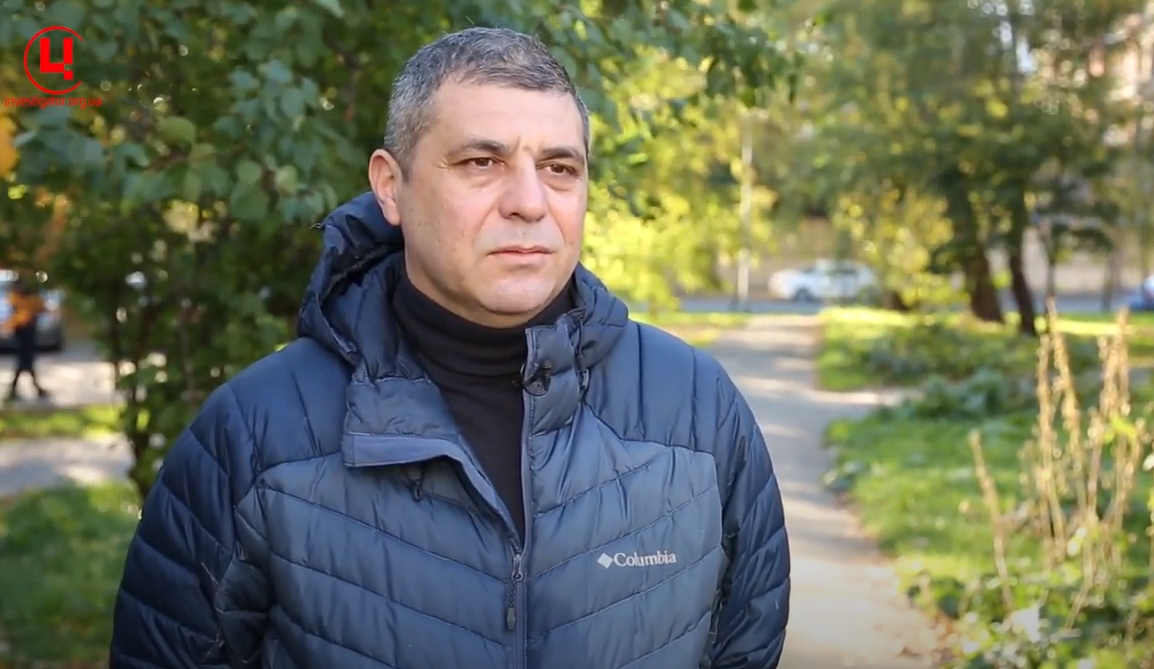
Yusuf Kurkchi, the First Deputy Minister for Reintegration of the Temporarily Occupied Territories of Ukraine in 2016-2019. Photo: investigator.org.ua
Therefore, the dealership of companies like «Avtodel» lies in the «gray zone». However, passenger cars imported from Western manufacturers do not fall under the EU sanction regime, as the Ministry of Economy and Export Control of the Federal Republic of Germany explained to DW. It is forbidden to sell in Crimea only «vehicles for transportation of more than 10 people as well as special purpose vehicles».
The Ministry for Reintegration of the Temporarily Occupied Territories of Ukraine within previous Cabinets believed in the opposite. They monitored violations of the sanction regime and insisted that the work of dealers selling European cars in Crimea did breach the non-recognition policy and, therefore, must have been banned. Moreover, the supply of cars to the peninsula violates the Ukrainian border and Ukrainian rules to enter the occupied territory. As an outcome, it threatens the national security of Ukraine.
«We prepared several proposals for the National Security and Defense Council of Ukraine, in order to impose sanctions on the sale in Crimea of the top worldwide car brands like KIA, Renault and Volkswagen. Unfortunately, we lacked the time to complete this work and introduce national sanctions», says Yusuf Kurkchi.
The Ministry of the Economy and Export Control of the Federal Republic of Germany also informed that the sale of passenger cars is forbidden for persons covered by EU sanctions. Violating companies would get into huge scandals whereas their managers would face 5 years imprisonment. Let us check what is going on in practice.
Volodymyr Konstantynov, the so-called Head of the State Council, has been often reported as the fan of luxury cars. Since March 2014, he has been included in all sanction lists. In accordance with his asset declaration, new BMW x7 M50d became part of his car collection last year. The car has been indicated as his property. It means that the sanction ban did not work. Or he bought the new car through intermediary.
EU sanctions ban the supply to Crimea of buses, trucks and special purpose vehicles manufactured by European companies. There is the scheme to avoid sanctions and to supply trucks manufactured by European as well as Russian companies, which do not want to be sanctioned. It is done through leasing agreements (financial leasing of equipment). The scheme has two tasks. The first is to meet partially the demand of small and medium size businesses for bank credits (sanctions made the banking activity in Crimea quite complicated as we remember). The second is to avoid the sanction ban on supply of truck and specialized vehicles.
Here is an example. There is the Crimean bank called «Genbank». Neither European car manufacturers nor Russian KAMAZ can make any transactions with this bank. In order to avoid sanctions, «Gen Leasing» has been set up. It has similar name and has been registered by the natural person. Then, «Gen Leasing» takes the money from «Genbank» and concludes agreements with KAMAZ. Moreover, there has been news on the website of «Gen Leasing» about joint offer with PSA Peugeot Citroen Russia (joint French-Russian enterprise). The client could get 11% discount on Peugeot and Citroen cars leased within this offer.
«Leasing transactions are not covered by sanctions. As an outcome, a number of investment issues can be successfully addressed through correspondent accounts in banks or leasing companies in Crimea. These are holes and shortcomings of the system of financial sanctions against Russia», says Yuri Smelyanski.
The same scheme of work in Crimea through intermediary companies based in Crimea and Russia is used to sell world brands (from clothes to gadgets) in Crimea.
«It is the huge drawback of the EU sanction regime, as it does not ban selling goods through franchising agreements in Crimea», says Tetyana Guchakova. «We are no longer surprised when Adidas shop opens here and the shop of some European brand opens there. It is all about franchising schemes. The legal entity is registered in Russia, de jure, it does not work in Crimea but de facto – it does! That is why any franchising agreement with EU and USA companies must contain clear ban on the work on the temporarily occupied territory of Ukraine!».
Sector not covered by sanctions
Final point is about the economic sector not covered by Western sectorial sanctions at all. Ukraine also did not introduce them. It is the agro-industrial sector and the land market.
Though there is the water shortage, the redistribution of agricultural lands is underway in Crimea. Russian bureaucrats, law enforcement and army officers (many of them are in sanction lists!) bring their businesses to Crimea. For them, it became «fashionable» to have their own gardens, vineyards or vine production facilities in Crimea. That is why the demand for fruit trees and shoots of grapes is immense in Crimea – more than 10 million per year. Local farms cannot meet this demand.
The Center of Journalist Investigations received direct evidence that farms from EU member-states (Italy, France, Austria and Bulgaria) and from Moldova and Serbia sell seedlings to Crimean companies and make direct supplies to the peninsula. The Russian Federal Service for Veterinary and Phytosanitary Surveillance issued permits to Crimean companies to bring in seedlings from European farms (permits are published on the website of the Service). Direct supplies are also confirmed by the personnel of those Crimean companies in interviews with the Center’s journalists.
The former director of the Crimean agricultural company told us that some European farms are «afraid to make direct supplies to Crimea, they are afraid of sanctions as their ministries monitor their activity. However, people are looking for commercial opportunities to sell their seedlings».
Alla Feshuk-Beregelska, the head of «Krymskaja fruktovaja compania», informed that fruit trees were bought from European companies «directly and officially» despite sanctions. Seedlings from European farms are transported to Crimea by refrigerators with necessary temperature regime. The Center of Journalist Investigations received documents from the «Crimean Customs Office» with numbers of these refrigerators and containers. They prove that it has been direct supplies from EU member-states.
The only way for them to get to Crimea is through the Kerch strait. It means illegal crossing of the Ukrainian state border and violation of the regime of closed Crimean seaports.
We also collected a lot of information about supplies of equipment manufactured by European companies and modern agricultural technologies to Crimean companies. Among them – companies owned by persons under sanction regime. «Skvortsovo» company owned by Viktor Polishuk, the former Minister of Agriculture of occupied Crimea, bought 20 harvesters in Netherlands. Igor Polishuk, his son and the general director of the group of companies, says in his interview to the local TV channel that «money is everything»: «When two businessmen talk about signing the contract for 100-300 thousand Euros, then, it is the Europeans’ problem of how to supply harvesters to Crimea».
However, EU sectorial sanctions do not cover agro-industrial complex of Crimea and Sebastopol. Only the general ban applies to transactions with Crimea and persons under sanctions; opening the new business and investments.
Why it is so important to expand EU sectorial sanctions and cover agricultural sector and the land market of Crimea? The reason is that Russia engaged into the aggressive colonization policy, which involves changes in population and redistribution of resources. Volodymyr Putin issued discriminatory decree forbidding non-Russian citizens to own the land on the majority of the Crimean territory. As an outcome, Ukrainian citizens residing in Crimea will be deprived of their property whereas Russian citizens will be clear beneficiaries of this decree.
The state owned «Masandra» with its nine factories and thousands of hectares will be sold in the near future. Today «Masandra» is included into EU and USA sanction lists. Will buyers and new owners of lands stolen from Ukraine be also included into sanction lists?

